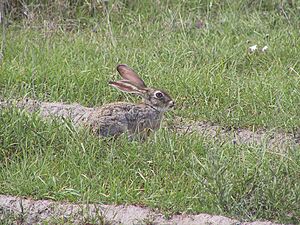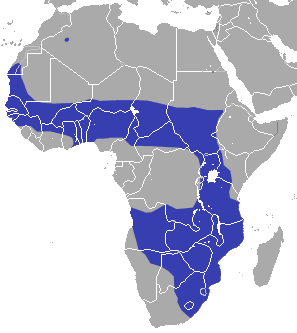African savanna hare facts for kids
Quick facts for kids African savanna hare |
|
|---|---|
 |
|
| Conservation status | |
| Scientific classification |
|
| Kingdom: | Animalia |
| Phylum: | Chordata |
| Class: | Mammalia |
| Order: | Lagomorpha |
| Family: | Leporidae |
| Genus: | Lepus |
| Species: |
L. victoriae
|
| Binomial name | |
| Lepus victoriae Thomas, 1893
|
|
 |
|
| African savanna hare range | |
| Script error: The function "autoWithCaption" does not exist. | |
| Synonyms | |
|
|
Script error: No such module "Check for conflicting parameters".
The African savanna hare (Lepus victoriae) is a type of mammal that lives in Africa. It belongs to the same family as rabbits and other hares. This animal is quite common and is not considered endangered. The IUCN Red List says it is of "least concern".
Where They Live
African savanna hares live in many different parts of Africa. They can be found in places like savannas, which are grassy plains with scattered trees. They also live in the Sahel, a dry area south of the Sahara Desert.
You can find them in countries such as Algeria, Botswana, Burundi, Chad, DR Congo, Côte d'Ivoire, Ethiopia, the Gambia, Ghana, Guinea, Guinea-Bissau, Kenya, Libya, Mali, Mauritania, Morocco, Mozambique, Namibia, Niger, Nigeria, Rwanda, Senegal, Sierra Leone, Somalia, South Africa, Sudan, Tanzania, Tunisia, Uganda, and Zambia.
What They Look Like
The African savanna hare is a medium-sized animal. It grows to be about 41 to 58 centimeters (16 to 23 inches) long. It usually weighs between 1.5 and 3 kilograms (3.3 to 6.6 pounds).
Its ears have black tips. The fur on its back and head is greyish-brown. Its sides and legs are a reddish-brown color. The fur on its belly is white. Hares living in mountains often have darker fur. Their tail is black on top and white underneath.
This hare looks a lot like the Cape hare. But you can tell them apart by looking at their incisors (front teeth). The African savanna hare has special grooves on its incisors.
How They Behave
African savanna hares are usually alone. They are also nocturnal, which means they are active at night. During the day, they rely on their camouflage to stay hidden.
If they need to escape danger, they can run very fast. They can reach speeds of up to 70 kilometers (43 miles) per hour. Sometimes, they leap sideways to confuse predators. This helps to break the scent trail they leave behind.
They mostly eat grasses and other plants. They also chew on roots, young shoots, and tree bark. Sometimes, they eat fallen fruit or even fungi. These hares also practice something called coprophagy. This means they eat their own dry droppings. This helps them get all the nutrients from their food.
Not much is known about how African savanna hares raise their young. They seem to have babies at any time of the year. A female hare can have several litters of young in one year. The baby hares are born out in the open. They can run very soon after they are born. The mother hare separates her babies. She visits each one at different times to let them drink her milk. They stop drinking milk when they are about one month old.
See also
 | Janet Taylor Pickett |
 | Synthia Saint James |
 | Howardena Pindell |
 | Faith Ringgold |


